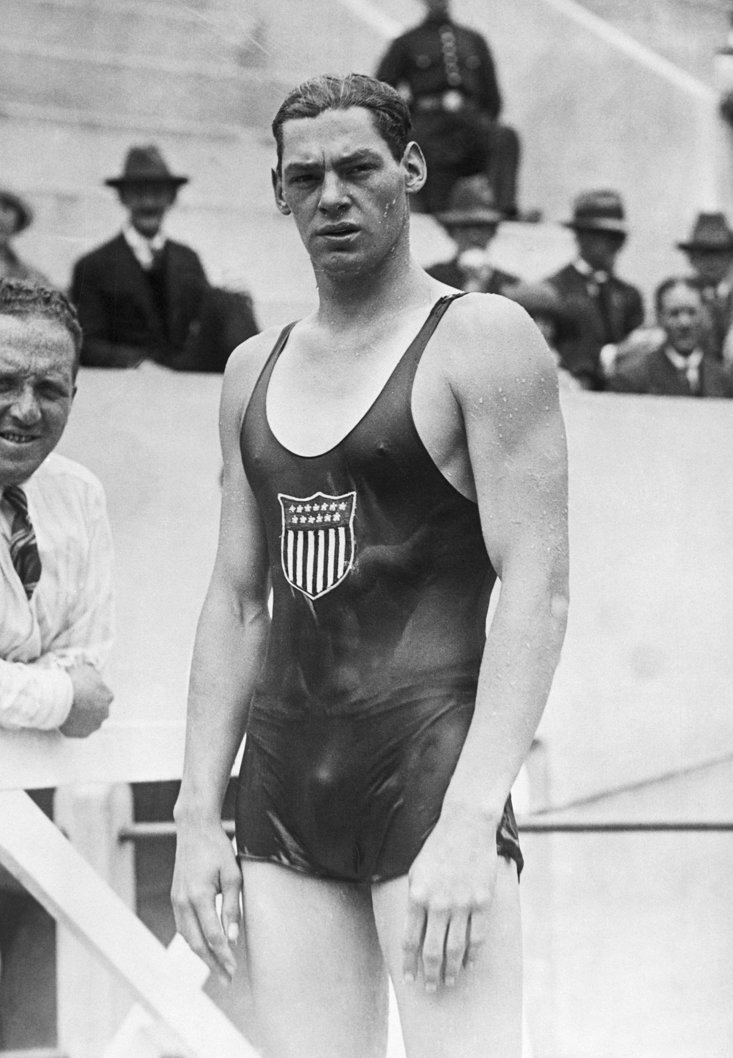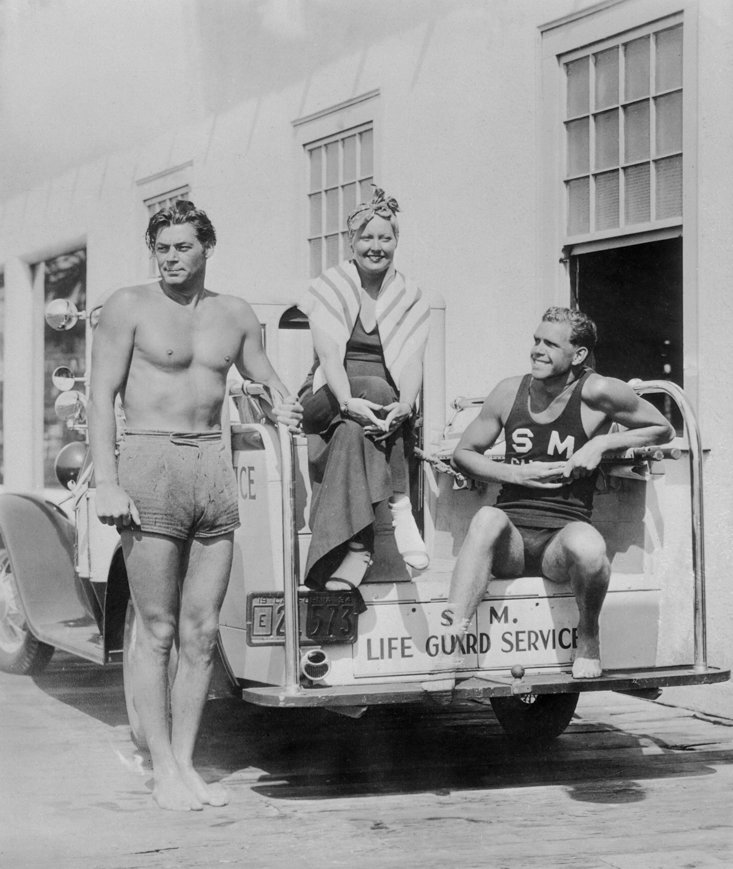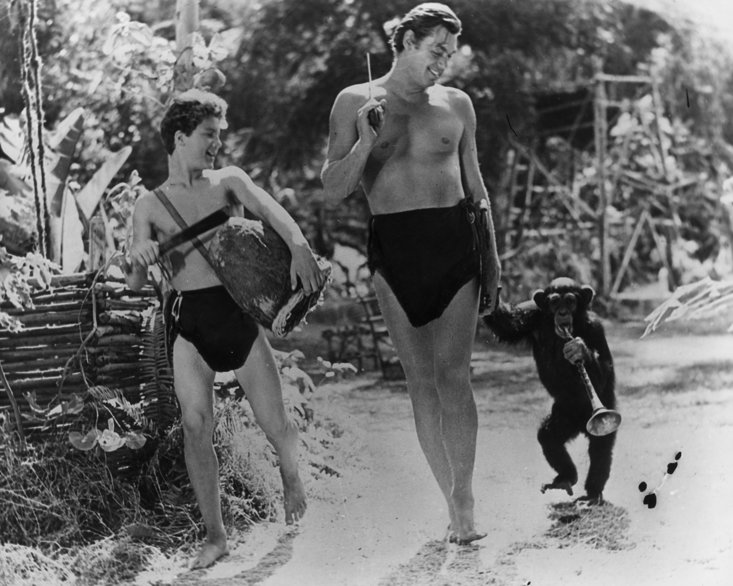Me, Sportsman. You, Reader.
He hung around with chimpanzees, rode around on the back of wild animals, fought crocodiles and alligators and, yes, even swung through the vines screaming at the top of his voice.
This wasn’t Tarzan. This was Johnny Weissmuller.
But before he was lord of the jungle to millions of delighted viewers the world over, Weissmuller was lord of the water. In fact, he’s most likely the greatest swimmer of all time.
On July 21, 1922, Weissmuller, just turned 18, became the first person to break the one minute barrier for the 100 metre freestyle, swimming the distance in 58.6 seconds at Alameda, California. It had smashed the previous watermark by two whole seconds.
Unfortunately for Weissmuller, he would hold the record for that swim time for just under two years.
Fortunately for Weissmuller, it was he who broke it.

In February 1924, not yet 20, he pipped his own standard by a second. No one would come close to Weissmuller for another decade, far and away the longest period of time one person would hold the top billing in the discipline since records began.
Johnny Weismuller began swimming at the age of eight, taking his first swimming lessons at Fullerton Beach on Lake Michigan.
Less than ten years later, he was a world record holder.
Fifteen years later he was Olympic champion.
Twenty years later he was a hero, in every sense of the word.
Thirty years later he was one of the most famous faces - and bodies - on the planet, as he cavorted through the jungle and MGM soundstage in nothing but a loincloth.
Not bad for the son of German émigrés, who had to grow up in a single-parent household in an impoverished neighbourhood of Chicago. It was in fact poverty in Illinois, however, that would have a dramatic effect on not just Weissmuller but the role he would be most identified with; Tarzan.
Though born in and during the time of the Austro-Hungarian empire in the early part of the twentieth century, Johnny Weissmuller had been in the United States of America since he was seven months old. By the time he died, aged 79 in 1984, he was both a national hero and global icon, afforded the rare honour of a 21-gun salute by President Ronald Reagan, and received honours from both sides of the Cold War, as well as the Vatican.
It’s difficult to articulate how many boxes Weissmuller ticked over the near-eight decades of his life.
With his lifelong personal and professional coach Bill Bachrach, Weissmuller was not only a swimming champion, he was the swimming champ, the paragon of the pool and beyond. Over the course of a year, their initial partnership integrated and adopted different stroke and kick methods and, by adapting them to Weissmuller’s individual style, developed his patented own crawl stroke. As one of his endorsement deals, he launched a streamlined one piece tank suit and then the first male swim trunk, making him one of the first sportsmen in history to endorse and design athletic wear.
But it is the sheer amount of records and landmarks he held to his name that made - and still makes - Johnny Weissmuller stand out amongst all athletes.
In 1922 alone he won nine National Championships and set 24 official world records. By 1923 he already held most of the world’s swimming records in distances from 50 meters to 500 yards; that year he added nine world records, and fifteen new US records to his name. On June 23, 1922 Weissmuller even set a 100 yard open water time of 52.8 seconds and a year later, at the 1924 Paris Olympics, he won three gold medals for freestyle in the 400m and 100m individuals and the 800m relay, and a bronze medal for water polo. Credited as one of the greatest swimming races of all time, to win the 100m gold he had to battle against the great Duke Kahanamoku, the surfing pioneer, for whom Weismuller considered both a rival and a friend. Nevertheless, Weissmuller won.
“Clearly, everyone agreed, Johnny Weissmuller was the star of the 1924 Olympic Games,” his biography references from the book Young Olympic Champions, “For the first time a swimmer had stolen the show from all other great athletes.
“He had his place in history; everyone knew that.”

Four years later in Amsterdam, he not only followed it up with two more gold medals, having led the U.S. delegation as the standard bearer in the Opening Ceremony of over 4000 athletes, alongside General Douglas MacArthur.
Weissmuller’s sublime swimming success had granted him worldwide prestige. He had a visit to Japan at the behest of Crown Prince Chichibu honour of the royal wedding, a special commendation and medal for athletic excellence by French President Doumerguen, got a special award for athletic excellence from Queen Wilhelmina of Holland, another honorary medal bestowed by the King of Belgium and had a private audience with President Calvin Coolidge.
Weissmuller formally retired from competitive swimming on January 3, 1929, deciding to go out on top, holding virtually all freestyle records in pools of all sizes, negotiating all distances, from 50 to 500 yards.
He retired with 67 world records (51 for individual events), 52 national championship gold medals, and his record of 38 individual US National titles stood until well into the 1980s. Furthermore, over 35 years since his death, and almost a century since he, Johnny Weissmuller is still number one on the list of Olympic gold medallists to have medalled in two sports.
Despite all his wins in water, his recognisability was about to go stratospheric when he started to swing through the air.
In the summer of 1931, he was swimming at Hollywood Athletic Club when he was spotted by MGM screenwriter Cyril Hume.
Hume was developing a new film, a project would come to be known as Tarzan the Ape Man. Observing the Olympian, Hume had found his star, the man to take the character from page to screen.
For most, the definitive screen Tarzan, Weismuller - in fact the sixth man to take on the role - portrayed Viscount Greystoke across twelve different films across 17 years, with each movie averaging around 140 million people through the gates.
Even today, say the word ‘Tarzan’ to a member of the public, and nine times out of ten, expect that recognisable yell to be the retort. That holler itself was based on the yodelling Weissmuller himself learned as a boy in that German Freidorf community of Chicago, when he was living on that single floor shared house with his abandoned mother. The Tarzan sound was even played to the homesick troops battling in World War II (notably, alongside playing lord of the apes, Weissmuller’s role during the conflict involved training soldiers to swim under water covered with burning oil-induced flame).
“Everything about Weissmuller was flowing, harmonious and natural,” described renowned author and professor of literature Edward Said, “Weissmuller’s Tarzan was pure existence, a sort of degree zero transmuted onto the figure and motions of an Adonis-like man.

“He was the natural hero in an age of heroes with supernatural or extra-human powers. Weissmuller embodied the man whose entirely human powers allowed him to exist in the jungle with dignity and prestige.”
As Tarzan, Weissmuller would himself wrestle live alligators, ride not just bareback on horses, but on the back of African rhinoceroses, and stand atop an elephant at the front of a herd. He adopted the role with gusto, his fearlessness, willingness, and Olympic athleticism the reasons he still remains synonymous with the role. Simply put, he belongs in the pantheon alongside Sean Connery’s 007, Christopher Lee’s Dracula, and Basil Rathbone’s Sherlock Holmes. But Weissmuller became nonpareil with his own individual prowess. While others were playing a character, Weissmuller was - and remains - Tarzan. Producers had even incorporated extra swimming scenes to capitalize on his status as virtually a modern-day Theoi Einalioi, a status that has been continually recognised across the past century.
In 1965, Weissmuller was chosen to be the first honouree at the newly created Swimming Hall of Fame and, in 1983, he was one of the twenty founding inductees to the US Olympic Hall of Fame.
In February 1950, Weissmuller was named the “Greatest Swimmer of the First Half-Century”. The Associated Press statement read: “There was no doubt that the tall, panther-like Weissmuller, a product of the public pools of Chicago, was to speed swimming what Jack Dempsey was to boxing, Babe Ruth to baseball and Bob Jones to golf. He shone in his field with brilliance and power.”
Weissmuller’s greatest act however, was neither in the Olympics, nor swinging from tree-to-tree for the entertainment of millions.
On July 28, 1927, while training for the Chicago River marathon - a competition he had won the previous year - in Lake Michigan, he and his brother Peter were witnesses to a passenger steamboat capsizing.
Instantly Johnny and Peter Weissmuller dove deep into the 90 metre-deep Great Lake, attempting to find survivors in the dark, murky water, again and again.
Eventually they pulled up over two dozen people from the wreckage, and tried to perform resuscitation on the unconscious. While 27 of the 71 passengers who had travelled on the ship died, the Weissmullers’ actions meant eleven were saved. Johnny was given the key to the city of Chicago for his bravery.
He won the marathon race only two days later. And set a new record.
Johnny Weissmuller - a hero who was greater off the screen than the one he presented on it.